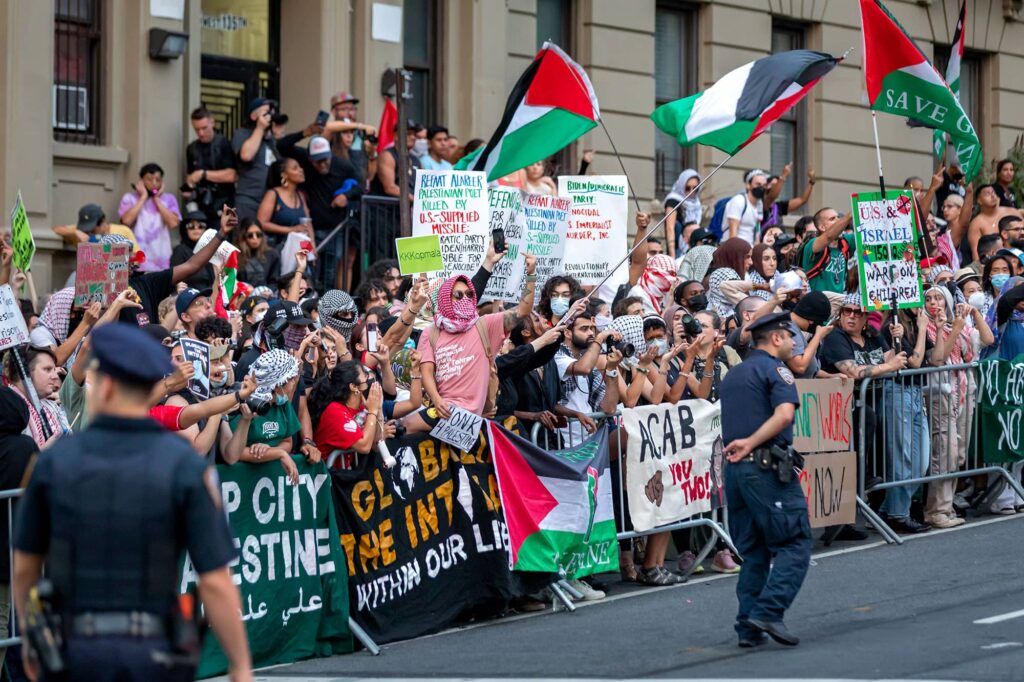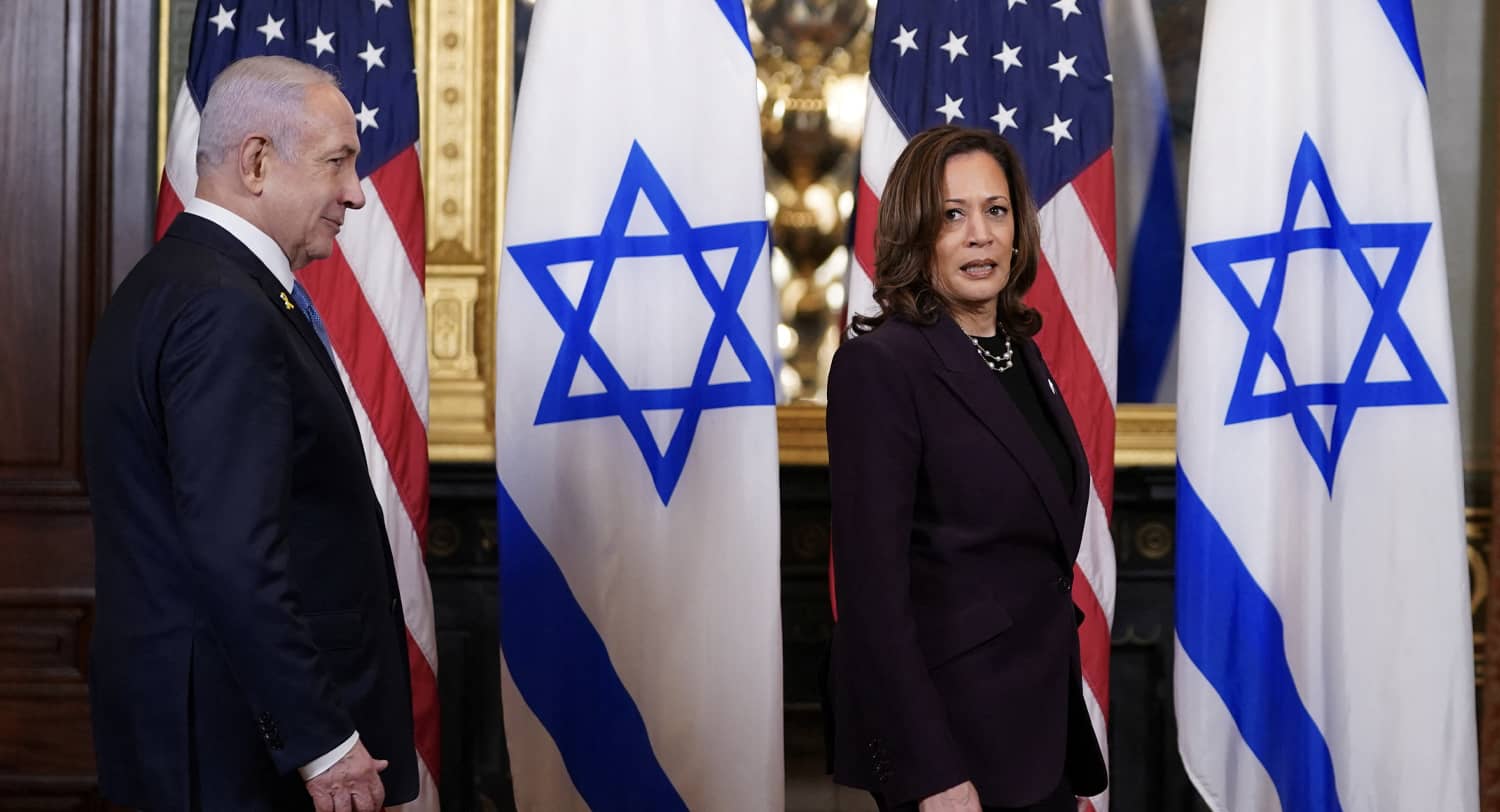Should she beat Donald Trump in this November’s election, Kamala Harris would come into office with more foreign policy experience than most presidents. As vice president, she made 17 foreign trips, giving a high-profile speech at the Munich Security Conference and leading the US delegation to the 2023 climate summit in Dubai. She has met with many world leaders, including those of China, Ukraine, Germany, and Israel, holding her own talks with Benjamin Netanyahu during the prime minister’s recent visit to the US to address a joint session of Congress.
With the catastrophic war in Gaza ongoing and impacting domestic politics here at home, there has been much speculation about what foreign policy on Israel-Palestine and the broader Middle East would look like under a Harris administration. It’s not possible to know precisely, in part because Harris will avoid doing anything during the campaign that would call into question the fact that Biden is determining policy until the end of his term in January. In addition, most new presidents take time to refine their foreign approach. Nonetheless, there are a number of assumptions about which we can be confident.
Harris will support Israeli security and favor a strong US-Israel relationship, as she has as vice president and senator – and since she “was a young girl collecting funds to plant trees for Israel.” She consistently supports security assistance to Israel, including the 10-year Memorandum of Understanding on military assistance negotiated under President Obama and additional funding for Israeli missile-defense systems, such as Iron Dome. Vice President Harris played a critical role in the National Security Supplemental Aid package, which included over $14 billion in aid to Israel as well as humanitarian aid for Gaza, calling congressional leadership to ensure its passage. Following Hamas’ attack on October 7, Vice President Harris backed Israel’s right to defend its people. She raised awareness of the sexual and gender-based violence committed that day and has met with rescued hostages and families of those still in captivity in Gaza.
At the same time, the Vice President has demonstrated care and concern for Palestinian lives and self-determination, adopting a nuanced approach on Israel-Palestine that reflects mainstream views and values within the Democratic Party and among most Jewish Americans. She has repeatedly maintained that “Israel has a right to defend itself, and how it does so matters.”
In December 2023, leaks emerged from the White House that Harris was advocating a tougher approach to the Netanyahu government’s prosecution of the war in Gaza. Publicly, she spoke of “heartbreaking” discussions she held with Palestinian Americans and stated, “As Israel pursues its military objectives in Gaza, we believe Israel must do more to protect innocent civilians.” The following March, she broke new ground for the administration in calling for “an immediate ceasefire” for at least six weeks “given the immense scale of suffering in Gaza.” She has since stated emphatically that she and President Biden “are working all around the clock every day to get that ceasefire done and bring the hostages home.” Following her meeting with Netanyahu in July, she commented, “What has happened in Gaza over the past nine months is devastating — the images of dead children and desperate, hungry people fleeing for safety, sometimes displaced for the second, third, or fourth time… And I will not be silent.”
As a senator, she took action against dangerous moves by Prime Minister Netanyahu and President Trump. In 2018, Harris signed a letter which strongly opposed President Trump’s decision to cut more than $500 million in humanitarian aid to the Palestinian people in the West Bank and Gaza. In 2020, she made clear that the new Israeli government must not carry through with provisions in its coalition agreement promoting unilateral annexation of West Bank territory, which would “put a negotiated peace further out of reach.”
In a recent interview, Vice President Harris noted the “many truths that exist at the same time” regarding the war in Gaza. She spoke of the killing of “far too many innocent Palestinian civilians,” the presence of “famine conditions,” and the desperate need to free the hostages and get humanitarian aid into Gaza. “We need a two-state solution,” she argued and has further said it’s “the only path that ensures Israel remains a secure, Jewish, and democratic state” and “ensures Palestinians can finally realize the freedom, security, and prosperity that they rightly deserve.” This mainstream position is highlighted in the 2024 Democratic platform and embraced by a substantial majority of Jewish American voters, who also support the US “exerting pressure on both the Israelis and Palestinians to make the compromises necessary to achieve peace.”
A Harris administration, even if it inherits a ceasefire in Gaza, will face extraordinary challenges in the Middle East, which cannot be decoupled from the crisis in Israel-Palestine. For one, Gaza will need to be rebuilt and rehabilitated, which will require the modern-day equivalent of a Marshall Plan, as well as effective security provision that will ensure that Hamas and other militant groups are not able to use Gaza as a staging ground for further attacks against Israel. Significantly, Harris was the first US official to underscore to Arab leaders the need to prioritize postwar planning, in a meeting on the sidelines of the December 2023 climate summit in Dubai. She noted that the international community would need to “dedicate significant resources” to Gaza reconstruction. Whether or not a Harris administration would lead an international effort to achieve these goals – perhaps in the context of a comprehensive regional security arrangement including Palestinian statehood and full regional normalization for Israel – is an open question.

Personnel is policy, and Harris has a team with both extensive experience and deep expertise in the Middle East.
Philip Gordon, her national security advisor, wrote about the Middle East while outside of government service. In a 2016 Council on Foreign Relations report, he said “repairing the US-Israel relationship” will require Israel taking a long series of steps including limiting and rolling back its occupation of the West Bank and welcoming the 2002 Arab Peace Initiative as a “starting point for negotiations on comprehensive peace.” He advocated for multilateral engagement and diplomatic de-escalation in the Middle East and helped negotiate the 2015 Iran nuclear deal.
Ilan Goldenberg, whom the Harris campaign has just tapped as its liaison to the American Jewish community, previously served as Harris’ special adviser on the Middle East, worked in the Obama Administration on Iran policy and as chief of staff to the Special Envoy for Israel-Palestine Negotiations Martin Indyk. Goldenberg has written extensively on how to achieve and secure a two-state solution and how to end Gaza’s “perpetual crisis.” Harris tasked Gordon and Goldenberg with devising proposals for the “day after” in Gaza, working with the National Security Council and the State Department.
Governor Tim Walz, her vice presidential pick, has consistently supported Israel’s security and the US-Israel relationship while a member of Congress, including by voting for US aid to Israel. He also voted for the Iran nuclear deal, calling it the “best chance we have had in years to halt the Iranian nuclear program.” In March, he stated in an interview that “you can hold competing things: that Israel has the right to defend itself, and the atrocities of October 7 are unacceptable, but Palestinian civilians being caught in this… has got to end.” He has expressed sympathy with Minnesotans who voted “uncommitted,” praising their engagement in the democratic process and stating that they are “deeply concerned, as we all are” with the “intolerable” situation in Gaza. He has advocated for a ceasefire, humanitarian aid for Gazans, and “a lasting two-state solution.”
Walz may help Harris pivot to a position that is more in line with the American electorate, and Democratic voters in particular, who are sympathetic to both Palestinians and Israelis. Contrary to conventional wisdom, voters do not believe that supporting Israel requires walking in lockstep with a right-wing Israeli prime minister.
The alternative to a Harris administration is unthinkable. As I have written elsewhere, given the track records of Donald Trump and JD Vance, a Trump-Vance administration “would likely be a disaster for Israelis and Palestinians, regional stability in the Middle East, US national security, Jewish Americans and other minorities, and democracy.”
At a time when bold and effective US leadership will be essential, Harris could promise a fresh start – and one managed by smart policy experts with a vision for how to bring both security and freedom to Israelis and Palestinians, while stabilizing the region and securing US interests.

